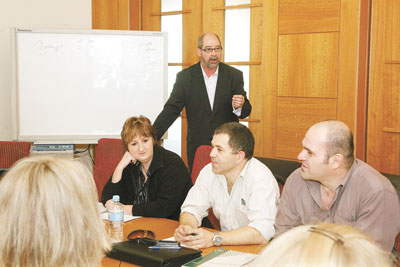Glen Eira City Council takes an integrated and innovative approach to talent management in recognition of the contribution its people make to the success of the organisation. The ‘cycle of learning’ encouraged and facilitated by Council transcends the state of the economy and short term employment trends.
As described by Susan Heron, CEO of the Australian Institute of Management Victoria and Tasmania, “The workplace is a competitive product and a point of competitive distinction. A place that retains and attracts good people, one that has a continual talent stream, is going to have a good bottom line outcome. People are our greatest asset and our greatest liability and that is a constant, regardless of the prevailing economic and labour market conditions.”
With the knowledge that retention is closely linked to the amount of attention employees receive in terms of professional development and growth, Council has developed a robust career development program. The focus is on skilling for the future and providing opportunities for employees to develop lifelong skills and continually invest in their career.
“The return on investment in training is there for both the individual and employer,” said Director Community Services Peter Jones. “A survey of staff found that training and development was highly valued and highly rated. By addressing that interest in learning, we have a win win solution.”
Professional development starts at orientation/induction level and is promoted through Council’s performance management system, corporate training program and department level.
On the job training and tertiary study are also promoted within the organisation, with many staff completing traineeships and postgraduate studies. An annual Learning Fortnight offers a range of workshops and short course to wet people’s appetites for learning.
Within a rigorous cost structure, Council provides study leave, as well as some payment plans and access to government funding to help reduce the cost of training.
Wherever possible, Council staff with relevant expertise also take the opportunity to conduct in house training, using their skills and experience to train others in their field.
There is no question of the contribution that training and development has made to Council’s overall performance. Staff acknowledge the value of further learning, turnover has remained relatively low, morale is high and, by all accounts, the workplace has become happier and healthier.
“All of this translates to high levels of employee engagement, improved services, cost savings and high levels of community satisfaction,” said Peter Jones.

















